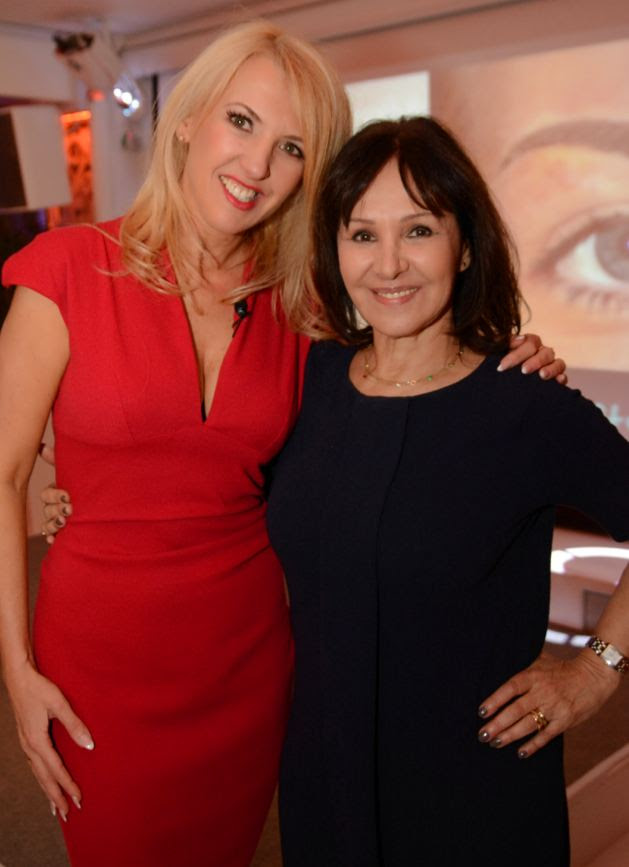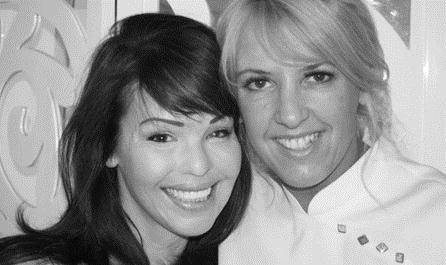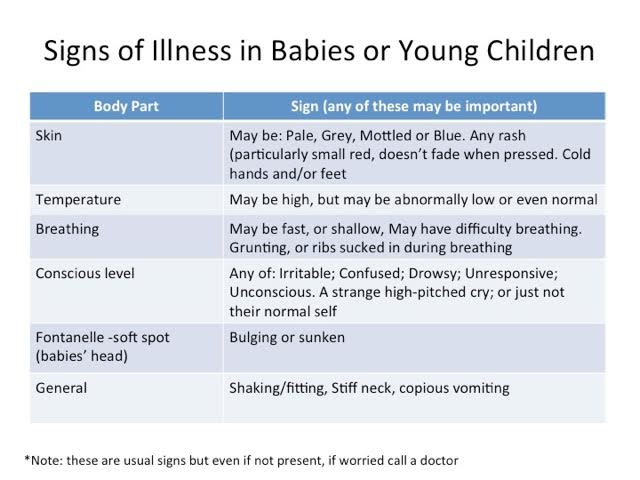Why are we doing an interview with a permanent make up artist you may ask. Permanent make up isn’t very ‘Frost’ usually, but Karen Betts is different. She gives the gift of confidence to those with illness. Like people who have lost their eyebrows to cancer. Karen has changed the lives of many individuals with medical permanent tattooing. See the photo below as an example. The other two pictures are Karen with Arlene Phillips and Katie Piper.



When and why did you first become interested in your profession?
I personally ventured into this field in 1996 after a childhood friend was diagnosed with breast cancer. I was not content with being just a pillar of support and wanted to be able to do more. At the time I ran a hair and beauty salon and a conventional tattooist used to rent one of my rooms, I thought to myself if you could adorn people’s bodies with such complex art why could you not develop a technique that would subtly enhance or replace facial features such as eyebrows. That is when I started my research and discovered a micro pigmentation course in the States.
What, if anything, has given you a competitive edge in this field?
My desire to always learn more, continuously develop my skills and share this knowledge with all who carry the Nouveau Contour name. I am not precious and love showing my students techniques I have developed that improve the quality of a treatment plus I am lucky to have a fabulous relationship with the manufacturer of the Nouveau Contour equipment and pigments and year on year we work together to develop and improve our products, we now have over 82 fundamental pigment colours to choose from, the largest range in the industry.
Describe your typical working day.
I am up very early most days and I do a few hours work on the computer managing my 8 brands before catching the train to one of my 3 training academies in Yorkshire, London or Milton Keynes. I absolutely hate to waste any time so once on the train the laptop is back out and I work solid until I reach my destination. I then either prepare for a training class or a full days clinic where I perform on average 10 permanent cosmetic procedures a day. Then you have guessed it, back on the laptop working on promotional plans, critical paths, training manuals, special offers, and budgets… I could go on and on but in essence I work constant all day every day until either my partner or very patient assistant shouts at me to eat something or go to bed. If there was 8 days in a week I would work them all.
What do you enjoy most about your job?
The feel good factor you get when you watch someone’s face light up after his or her treatment is just amazing!
What’s been your biggest professional achievement to date?
Whilst a lot of my clients are memorable in their own rights 2 clients over the last few years have really pulled at my heartstrings and tested my capabilities. The first is a lady named Julie who was born with a cleft lip. Julie’s cleft lip has affected her confidence for as long as she can remember, aware that the shape of her lip had held her back and prevented her from making the most of her life I wanted to give Julie the perfect lip shape she had always dreamed of. To restore a cleft lip using permanent cosmetics requires a real level of skill that does not come over night but I am happy to state that Julie was overwhelmed with the results and quoted “Karen created the lip shape I had been looking for my whole life”. Her smile and the big hug she gave me at the end of her treatment spoke volumes and I am not ashamed to say, made me cry.
The second lady many people will recognise as her recovery from a brutal acid attack in 2008 was documented in the TV series ‘Katie Piper – My Beautiful Face’. I was honoured when I was able to help Katie. Over a twelve month process, I was able to recreate Katie’s lips, brows and eye definition. Over time our personal and professional relationship developed and in 2012 I was announced as the official and exclusive permanent make-up consultant for The Katie Piper Foundation.
What advice would you give to somebody wanting to become a permanent makeup artist?
As Permanent Cosmetics is a very precise procedure, the need for the correct training and support is of the utmost importance. I would advise anyone considering a career in this field to first attend an insight day if the company offers one, this gives the person an opportunity to discover:
What is permanent cosmetics?
Do I have what it takes to be a successful permanent cosmetics artist?
What are the training options?
How long will the training take and how much will it cost?
What equipment do you need to perform treatments?
What treatments can I train in?
What do I need to do to ensure I get return on my investment?
People also need to look for a company that not only listens to what they want from their training experience but whose trainers actively carry out procedures on a daily basis.
Continuous professional development is paramount in this field as techniques and equipment are improving year on year therefore people should look for training providers who offer continued learning with free workshops and shadowing days.
I also recommend that they ask themselves the following questions:
Am I prepared to change someone’s face?
Have I got the determination and drive to make this a success?
What skills can people learn at the Nouveau Contour Training School?
We offer a developmental training programme designed to turn absolute beginners into elite permanent cosmetics artists. Our foundation courses range from 8 to 31 days long and the student can choose the training option that best suits their lifestyle and financial budget. For a full explaining of our training options visit http://pro.nouveaubeautygroup.com/nouveau-contour/training-options/
What are the pros and cons of permanent makeup?
In today’s increasingly fast-paced world, it can be hard work looking our best all the time. Juggling a career with home life is tough and our appearance isn’t always a priority. That’s why each year in the UK; thousands of women and men opt for permanent cosmetic enhancements as a timesaving way to look their best with minimum effort.
No longer considered a treatment just for the rich and famous, men and women of all backgrounds and social standing are opting for permanent makeup procedures as a way to save time and in many cases boost confidence.
Permanent makeup is also ideal for people who take part in sport, have difficulty applying makeup or are allergic to cosmetics. It can also help to camouflage scarring and bring life-changing benefits to alopecia sufferers and to people who have had breast reconstruction work or have experienced hair loss following chemotherapy treatment.
The only downside is there is some poorly trained permanent cosmetics artist offering treatments. Research your technician and be very clear about the result you want to achieve. The main risk is choosing a poorly educated technician just because they may be less expensive. Permanent makeup should be considered exactly that – permanent. Whilst designed to fade you should always regard the treatment as irreversible and when deciding on your technician you should always research the company they trained with, the equipment and pigments they use and indeed when they last refreshed their skills. I would also recommend that you ask to view their portfolio and do not be afraid to ask if it is their own work they are presenting to you.
Is there any ‘look’ that you’d refuse to do? For example a very unnatural/dramatic look?
With permanent make up it is not about following fashion trends but subtly enhancing or replacing someone’s natural features, obviously I can improve area’s, for example, as we mature we loose volume in our lips and I can use clever shading technique to create the illusion of a softer, plump more youthful mouth, but on the whole I do not look to other people to create permanent make up looks as it is more important to understand the individual personality, lifestyle and look of the person I am treating.
As well as Katie Piper, have you had any celebrity clients?
Over the last 16 years I have been able to use my skills to help thousands of ladies both for cosmetic and medical purposes and I pride myself on treating every client exactly the same no matter who they are or what their profession.
I am discreet and professional and many high profile clients come to be because of that therefore I can not disclose all my celebrity clients. However on my website with their permission you will see that I have treated Amy Child’s and her manager Claire Powell, Coronation Street actresses Sally Dynevor and Cath Tyldesley, Sugababes Jade Ewan, Olympian Jade Johnson, choreographer, TV presenter and judge of Strictly Come Dancing Arlene Phillips, Spanish model Elen Rivas, TV presenter Lizzie Cundy, TV presenter and model Sue Moxley.
Do a lot of celebrities have permanent makeup nowadays?
Yes they do and in turn these celebrities speaking out about the benefits of permanent make-up has resulted in many new clients coming to see me for a consultation/treatment for both cosmetic and medical treatments.
What’s the most fulfilling thing about your job i.e. Helping survivors restore confidence
I feel privilege everyday that I have a skill that can help rebuild so many people’s confidence and nothing I have achieved beats the look on a clients face when I have restored a feature that they have lost through illness or an accident.
What’s your motto, or the key premise / message of your business?
My motto is always smile, laugh and try to remain positive even when things are going really bad. Life really is too short to be bogged down with negativity.
The key message of my business is education, education is a powerful tool and I have built my training schools on the premise that at Nouveau Beauty Group we offer long term careers not just course, we want all our students to be the best they can be and actively promote continued professional development. I have been in the beauty business for over 20 years and still do not claim to know everything, I love surrounding myself with people from other industries that I can learn from and often I implement their advise into my business model.
What are the advantages of permanent makeup over regular makeup?
The benefits of permanent makeup over conventional makeup are immeasurable, one example is in the summer when the temperature increases and makeup can sweat off or indeed wash off if you are on holiday and fancy a dip in the pool. With subtly applied permanent cosmetics designed to mimic the most natural makeup look, ladies no longer have to worry about pencilling their eyebrows back in or their eyeliner smudging.
I also recommend everyone to watch the video testimonials on my website as these are real women sharing their personal experience of why they opted for permanent makeup and defy anyone to not understand the advantages of permanent makeup over conventional makeup for those living with an altered facial appearance as a result of an accident or illness.
http://www.karenbetts.co.uk/






